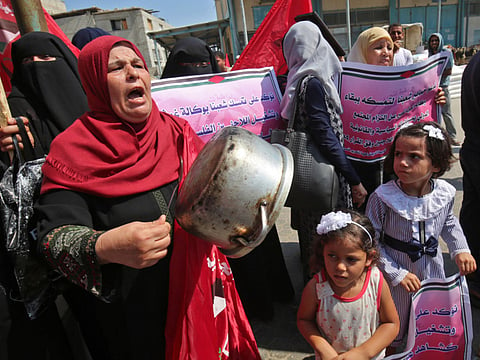UNRWA cuts doom Gazan residents to uncertain future
UNRWA has slashed jobs of 158 teachers and 194 contract workers

Gaza: Ola Abu Qomsan finds herself in hot water. The mother of four was informed by the United Nations agency for Palestinian refugees (UNRWA) early last month she could no longer work as a psychologist at a school in Gaza’s Shujaia neighbourhood.
“This was a nightmare. I had never imagined things would get so bad. Is this how UNRWA’s Palestinian employees are rewarded after providing services to their community under the harshest circumstances?” she asked.
The decision to slash jobs has placed Ola in grave economic peril, as she was the sole breadwinner in her family. Her husband is unemployed, and one of her children suffers from a pervasive developmental disorder and needs special care that has been a financial burden on her family.
“My life has turned into a living hell following this disastrous decision [by UNRWA to cut jobs]. How can my family survive after losing our only source of income? We will never succumb to this policy, we will keep protesting until we are reinstated in our jobs. This is our right, they cannot cut our jobs in this way and deprive us of the possibility to live our lives with dignity,” Ola said bitterly.
UNRWA laid off 158 teachers, and 194 other employees who work under the contract system. It has also informed 600 other workers and teachers their contracts will be terminated by the end of 2018, due to acute shortages.
“Dangerous aid cuts”
On August 24, the US announced it had cancelled more than $200 million in aid for the Palestinians in the Gaza Strip and West Bank. Days later, it said it would end funding for UNRWA, describing the organisation was “irredeemably flawed”. The US, traditionally the biggest donor for UNRWA, has provided only $60 million this year, compared to the $365 million it used to pay in previous years.
The severe cuts will have a profoundly negative impact on the devastated coastal enclave, which as a result of the decade-long Israeli blockade and three devastating wars launched by the occupation regime, is suffering from crumbling infrastructure and acute poverty. Amal Al Batsh, deputy head of UNRWA’s workers’ syndicate in Gaza, warned the drastic cuts to the relief and education programmes of the agency will have potentially dangerous implications.
“We are very concerned about the impact [the cuts are having on the] UN’s operations in Gaza, in important fields like education, public services, health, and other crucial programmes. A majority of Gaza residents are dependent on UNRWA and what it used to provide — basic commodities such as flour, rice, sugar, milk, and other necessities that helped Gaza’s families survive under these dire circumstances,” she said.
A breakdown in education is also feared, she added, after UNRWA started laying off teachers from schools. “The only option provided for the affected communities like those who lost their jobs or those who are no longer receiving aid is to protest and demand their rights.”
Halima Sarhan fainted during protests held near the UN’s headquarters in Gaza city. The mother of seven has been a regular participant at these protests and said she will not stop this until she gets her job back. “I cannot endure this situation. I suffer from diabetes, high blood pressure, and had a blood coagulation four months ago,” she said, breaking down. Her husband is also unemployed and she has to meet her family’s growing demands.
“Three of my children are now in university, and my husband and I need money for our medication. The list is endless when it comes to how costly living conditions are nowadays,” she added.
Ziad Al Sarafandi, a member of the refugees’ department in the Gaza Strip, told Gulf News that Washington’s efforts to weaken UNRWA by imposing serious cuts to its budget are meant to make a decision on one of the major Palestinian issues — refugees.
“The US administration, the Israeli occupation regime’s biggest ally, falsely claims the international organisation is inflating the numbers of Palestinian refugees by conferring refugee status on descendants of more than 750,000 Palestinians who fled their ancestral villages in 1948 as a result of the genocide perpetrated against them by the Zionists,” he said.
He added Washington was working to obliterate the Palestinians’ right of return, and end the refugee crisis by closing down the international relief organisation that was established to deal with this issue.
He also said Palestinian refugees, wherever they may be based, are impacted by the new US policy, as all refugees — not only those based in Gaza but also those in the West Bank, Jordan, Lebanon, and Syria — will be targeted as part of the UNRWA cuts.
“The Jordanian authorities are scrambling for additional financial assistance as Jordan is home to the highest number of Palestinian refugees. The drastic cuts will definitely cause problems and this will lead to chaos in the region,” he said.
Al Sarafandi expressed his shock at how America has dealt with the situation. “Does the American administration believe that by not longer providing services for the Palestinian refugees, those refugees are going to vanish and forget about their right of return?”
- Isra Namey is a freelance journalist based in Gaza



